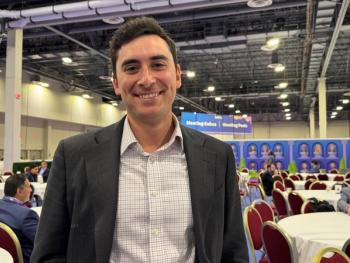
The Importance and Expansion of COVID-19 Testing
The CEO of a medical technology and diagnostics company discusses why individual testing for COVID-19 will be part of the landscape for the foreseeable future.
The public health focus of the COVID-19 pandemic has shifted from testing to getting as many people vaccinated as possible—this week, the FDA could authorize vaccines for youth as young as 12 years old. But testing is still important, and will likely be with us for some time, according to Ted Karkus, CEO of ProPhase Labs, Inc., who spoke with Chief Healthcare Executive.
CHE: As the emphasis has turned to vaccination, which groups are the primary ones being tested?
Karkus: The primary group being tested is symptomatic people. It appears that everyone is letting their guard down. Understandably, everyone is psychologically burned out from the past year of the pandemic. However, there has been a significant wave of COVID-19 in Europe and upturns in COVID-19 incidents in some parts of the United States. People think that now that the vaccine is here they don’t need to be tested—which is dangerous. If you are vaccinated, you can still be infected with COVID-19 and still pass it on to others. The vaccine is more likely to diminish symptoms which in turn means that more people are likely to be walking around with COVID-19 that are totally unaware. Also, as facilities begin to reopen, many states are creating guidelines, one of those being a baseline requirement before reopening. This means that a lot of facilities are having to test their entire staff or residents to create a baseline of coronavirus cases so that they can monitor spikes and keep control of the situation. As events and travel begin to increase, we will also see large groups of people who need to be tested for entrance to sporting events, airline travel, weddings, etc.
CHE: Which groups are not being tested that should be tested?
Karkus: Virtually everyone should be getting tested, at least sporadically. If you are going to restaurants or work or any large social gathering, or have come in contact with someone that may have COVID-19 or symptoms of COVID-19-19, then you should be tested.
CHE: What types of testing technology are recommended for various groups? How do we match the testing technology to the circumstance—for example, a test for a nursing home vs. the pre-game test for an NBA basketball game?
Karkus: This is actually a quite complicated question and the answers are many. For example, in New York, at first, no fans were allowed in a major sporting event. Then, they were allowed on a limited basis with a negative PCR COVID-19 test. Then, proof of vaccination or a rapid antigen test was also acceptable. The problem with a vaccination record is that it does not prevent you from catching and spreading the virus. As for a rapid test, the results for most rapid tests are significantly less reliable than PCR testing. However, if you have been vaccinated, then showing your record is a lot more convenient than getting another COVID-19 test. The same goes for rapid tests, which give you immediate results but are not reliable. At ProPhase Labs, we try to address this issue by providing the gold standard PCR testing with results in less than 24 hours. This provides the convenience that is often needed while providing the most accurate and safest results.
CHE: Can we expect that testing will become a routine part of certain experiences, such as overseas travel, going to a wedding, or getting certain medical procedures? What will be the time frame for that?
Karkus: It’s a bit different depending on whether you are looking at it from a state, national, or international perspective. For example, in New York State you have already seen this take place in all of those aspects. People who are having weddings ask that you get tested beforehand, New York State requires two negative tests to opt-out of quarantine after traveling to certain states (one before departure and one four days after return to the state), and sporting events have required proof of a negative test or now vaccination results. On the other hand, you have states like Florida that have let people determine whether or not they want to get tested and let those establishments carry those decisions. Europe is currently experiencing another COVID-19 wave and Britain for example is considering implementing two tests a week for their citizens. So, on an International scale, and for U.S. citizens wanting to travel to foreign countries, I think it will become a regular practice.
CHE: Whose job is to decide when people should be tested? Is it the government/health authority, or private entities like the NCAA or Professional Golf Association, or the airlines?
Karkus: Its common sense that health authorities and experts should be making these recommendations or regulations. Private entities do not have a holistic view of cases across the country and they are also not certified to speak on a global pandemic.
CHE: What have we learned about testing during the first year of the pandemic? What did we do right and what mistakes were made?
Karkus: After one year of testing and throughout the pandemic, I think we learned that we are going to be dealing with the virus for years to come. That means testing is here to stay. In general, once the severity of the situation set in—people did a good job of staying home, business and schools began work-from-home and virtual learning to help stop the spread, and people also became more hygienic through constantly washing their hands, using sanitizer, and using other PPE. However, one mistake made was not emphasizing the importance of testing on a national scale and as a result, testing was not conducted at the levels it should have been from the very start. Even now, with the administration change and emphasis put on testing by experts, we are still having to evolve testing so that more and more people will participate. That’s why you see a lot of new technologies and at-home testing being developed, approved by the FDA, and commercialized.
About the Expert
Ted Karkus is CEO of ProPhase Labs, Inc. In this role, he directly manages and oversees corporate strategy, product development, sales and marketing, and R&D. Karkus has long focused his career on investing, management consulting and managing emerging growth companies.



































